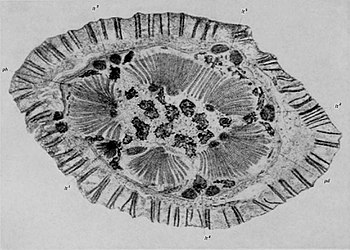
|
|
Fig. 1.—Calamites. Part of transverse section of a young
stem, showing pith, vascular bundles with secondary wood,
and cortex. (× about 40.) From a photograph (Scott, “Studies”).
|
|
|

|
|
Fig. 4.—Palaeostachya pedunculata.
Fertile shoot, bearing
numerous cones and a few
leaves. After Williamson (Scott,
“Studies”).
|
|
|
| Plate.
|

|
|
Fig. 22.—Lyginodendron oldhamium. Transverse section of stem,
showing the pith containing groups of sclerotic cells, the primary
xylem-strands, secondary wood and phloem, pericycle and cortex.
𝑙𝑡1-𝑙𝑡5, leaf-traces, numbered according to the phyllotaxis, 𝑙𝑡5
belonging to the lowest leaf of the five; 𝑝ℎ, a group of primary
phloem; 𝑝𝑑, periderm, formed from pericycle. (× 3.)
|
|
|
Fig. 31.—Cordaianthus Penjoni. A, Male catkin in longitudinal
section: 𝑎, axis; 𝑏, bracts; 𝑐, 𝑑, filaments of stamens, hearing the
pollen-sacs (𝑒 and 𝑓) at the top; 𝑣, apex of axis. (× 61/2.)
B, Stamens more
highly magnified: 𝑔, vascular bundle of filament; 𝑒, pollen-sac
after dehiscence. (× 23.) After Renault (Scott, “Studies”).
|
